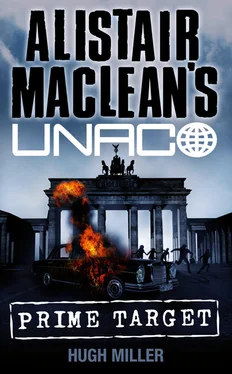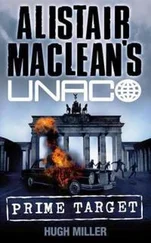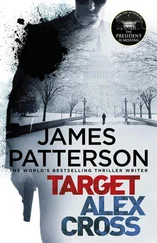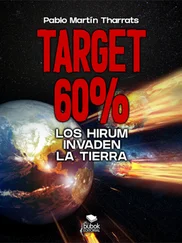Hitler nodded. Albers led the way round the edge of the garden and out on to the street. The wind had dropped but the rain was heavier now, falling in ice-cold sheets that numbed the skin. Hitler walked between Goebbels and the guard, his hands tucked in the pockets of his greatcoat, the peak of his cap pulled close to his eyes. As they reached the edge of the road a shell exploded three streets away. The others broke step but Hitler kept walking as if he hadn’t heard.
Drawing near the line of boys, who all looked thoroughly miserable, the Führer took his hands from his pockets and straightened his shoulders. Immediately he appeared to grow a couple of inches. He raised his head and thrust forward his jaw, making it taut. He fixed his famous stare on the boys and smiled.
At a nod from Goebbels, thirty arms shot out in the Nazi salute. ‘Heil, Hitler!’ the boys chorused. The sound of it echoed through the hollowed-out buildings behind them.
Hitler stood on the pitted road before them and returned the salute. The SS officer raised a battered Leica camera to his eye and pressed the shutter, recording the moment. Goebbels nodded again and the boys stood at ease. General Albers cleared his throat and stepped forward.
‘Führer, I have the honour of presenting to you the most recent and final group of inductees to the Hitler Youth. This is a very special body, made up of thirty appropriately special young men. They are orphans, every one, and each is the son of a hero of the Third Reich.’
Albers walked to one end of the line with a sheaf of notes in his hand. He waited for Hitler to join him, then he introduced the boys one by one.
‘Erich Bahr, aged twelve years, son of Area Commandant Konrad Bahr, killed with his wife Frieda in the bombing of Dresden in February. Klaus Garlan, aged ten years, son of Panzer Commander Gregor Garlan, killed in the Western Desert in 1944, mother Louisa Garlan killed in a bombing raid on north-west Berlin in January 1945. Albrecht Schröder, aged twelve years, son of Otto Schröder…’
Hitler listened attentively and shook each boy’s hand before moving on to the next. By the time he reached the end of the line the rain had soaked right through his clothing and he was stooping again, his head jutting forward from hunched shoulders. He continued to smile nevertheless, as if sunshine blessed their little ceremony.
As he moved to the centre of the road to address the boys two shells landed nearby within a split second of each other. The shockwave struck Hitler obliquely, making him stumble. Five of the remaining Chancellery windows blew out in a cascade of glass and metal and stone. Hitler watched clouds of glittering dust rise around the base of the building.
‘A Jewish-Bolshevik reprisal for Kristallnacht, perhaps,’ he said, trying to revive his smile.
He turned, straightening his cap, pulling the lapels of his sopping greatcoat closer to his ears. When he spoke his voice was firm.
‘I am told that tomorrow, or at the latest the day after, American and Soviet tanks will meet on the Elbe at Torgau. My dear boys, in that dark moment the Germany I dreamed of, the Fatherland I fought with all my heart and strength to build into a living reality, will be dead. It will have been killed. It will have been murdered by barbarians at the incitement of the International Jew.’
He paused and took a long deep breath.
‘All that we love most dearly will be turned to smoke, and the smoke will disperse on the wind. Yet I tell you, my young friends, in this moment as I look at you, my heart swells with hope…’
Hitler let his gaze travel along the line, pausing a moment on each young face.
‘I look at you and I see the essence of my Jugend, my ideal of the Aryan spirit. I see it in every one of you, the bright promise of a race and nation, the natural enemy of those who lay waste to our beloved land.’
General Albers moved a fraction closer, just to be sure: he took a swift hard look at the Führer’s face and yes, he could see, there were tears welling in his eyes.
‘In your maturity you will bear many duties,’ Hitler said, his voice rising above the rumble and crash of gunfire. ‘The most important of them, the most sacred, will be to uphold and keep alive the spirit of the Reich, and to eliminate its darkest enemy, with no thought of mercy. This is a precious charge. You boys, as its bearers, are no less precious.’
He paused and looked along the line again.
‘You are the young, pounding heart of Germany,’ he said. ‘You are the embodiment of Siegfried, the strength and hope of your race. You are the future.’
Several boys were smothering tears. Another shell went off, bringing down rubble at the end of the street.
General Albers sidled up to Hitler and spoke in a sharp whisper. ‘We should get back to the bunker, Führer, as much for the sake of the boys as for ourselves. The chances of us all leaving here undamaged must be slim by now.’
Hitler nodded slowly and turned away. Albers and Goebbels fell in behind him. The guard led the way back across the Chancellery garden, the sodden earth sucking under their boots. At the top of the bunker steps Hitler stopped and looked back at the street. The SS officer was shepherding the boys back into the gutted office building. Hitler shook his head.
‘What a thing it would be,’ he said.
Albers and Goebbels looked at each other, mystified.
‘To be young again,’ Hitler said. ‘That young, with everything still to happen.’
Later, as General Albers sat in his quarters, recording the day’s events in his diary, he looked up at the agonized Christ on a large wood-and-ivory crucifix by his bed.
‘Not long now,’ he said quietly. ‘A week at most, with luck.’
The realism of the crucifix sometimes struck him as grotesque, but he kept it by him. It was the only memento of his wife, the one item to survive the inferno of their cottage after a British bomb reduced everything else, Greta included, to ash and vapour.
‘Perhaps, Lord,’ he said, ‘you will arrange it so I can surrender to someone with a sense of irony, and no great desire to punish.’
He looked at the diary again and thought for a moment before finishing the page. The small, special brotherhood is established, he wrote. If the meticulous plans of Secretary Bormann and Minister Goebbels unfold in the way they are intended, the remaining Jews in Germany will one day feel the Führer’s throttling grip from beyond the grave.
He put down the pen and rubbed his hands together. The room was cold and damp. He pushed back the chair, got down on his knees and peered under the bed. There was probably enough schnapps under there to ease the chill. He pulled out the bottle and held it up. Three good drinks, maybe four.
‘Enough for now.’
He stood up, took the tumbler from the night-stand and poured a measure. With the glass held out before him he felt an impulse to toast the future of the thirty bedraggled orphans. They had looked so downcast. Just pathetic, frightened, parentless children.
That was now. But years from now…
‘God,’ he groaned, ‘all the black tomorrows.’
He looked at his row of treasured books on the shelf above the bed; at the framed snapshot of himself and his brother as children; at the ivory face of Christ hanging there, twisted with pain and despair.
‘Why should I wish more calamity on the world?’
Outside in the passage there was the sound of shouting. The wise men in the map room were being outraged again, berating absent commanders for the failure of crazy stratagems to rescue the Nazi dream. Albers sighed and raised his glass to the crucifix.
‘Shalom,’ he whispered.
Читать дальше












